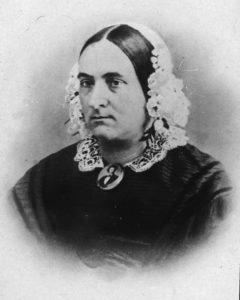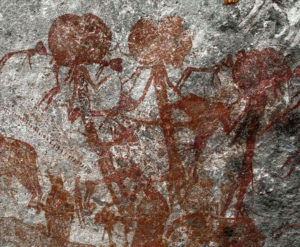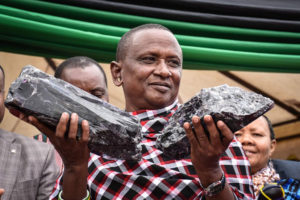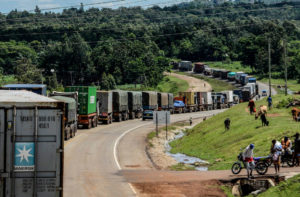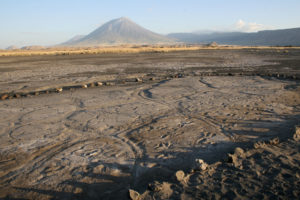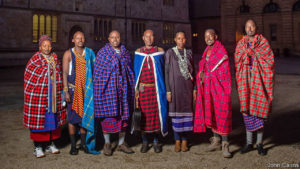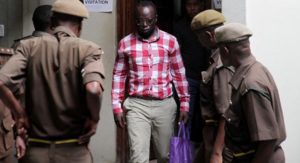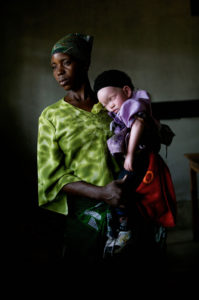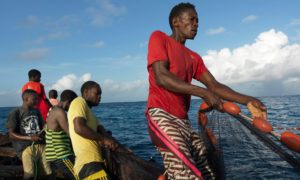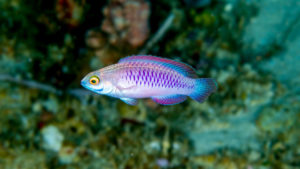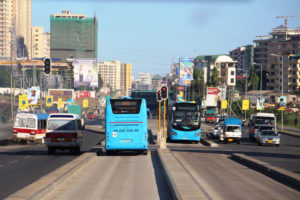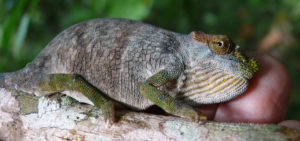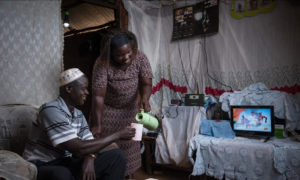by Donovan McGrath
Tanzanian opposition leader Freeman Mbowe in court to face charges
(Aljazeera online – UAE) Extract: Freeman Mbowe, leader of Tanzania’s main opposition party, has appeared in court to face “terrorism” charges, in a case denounced by his supporters as a politically motivated move aimed at crushing dissent. The 59-year-old chairman of the Chadema party has been behind bars since July 21 when he was arrested along with other senior party officials in a night-time police raid just hours before they were to hold a public forum to demand constitutional reforms… The opposition has denounced the arrests as a throwback to the oppressive rule of Tanzania’s late leader John Magufuli who died suddenly in March. There had been hope that [Salmia Suluhu] Hassan would bring about a new era of democracy after the increasingly heavy-handed rule of Magufuli but Chadema leaders say the arrests of Mbowe and his colleagues reflect a deepening slide into “dictatorship”…. (31 August 2021) Thanks to John Rollinson who informed me of two brief mentions of Freeman Mbowe’s court appearances published in the weekly politics section of the Economist – Editor
‘No power to stop it’: optimism turns to frustration over east Africa pipline
(Guardian online – UK) Promised an income, those affected by $20bn oil project are losing their land and resources instead. Extract continues: The villagers in the Kijungu settlements welcomed the project when the route was announced in 2017, hoping that the government and companies involved would buy their land and change their lives for good. Their optimism has since given way to frustration. Adrin Tugume, 53, depends on her land to feed her 10 children and sell bananas, cassava, beans and maize. Although construction is not yet under way, she has been asked to stay off the portion of land where the pipeline will be built. “I was stopped from using my land for three years. It is where we get food for our children… The opposition to the project is not just about humanitarian concerns. The east African crude oil pipeline (EACOP) will transport oil 900 miles (1,450km) from the shores of Lake Albert on the border between Uganda and the Democratic Republic of the Congo through Tanzania to the port of Tanga on the Indian Ocean… Uganda and Tanzania signed agreements with the French oil and gas company Total and the China National Offshore Oil Corporation (CNOOC). The pipeline will pass through the habitats of at-risk species. It could jeopardise community water sources and pollute the air, and its construction will be intrusive and noisy. In Shinyanga in Tanzania, local government authorities have admitted that environmental disturbance is inevitable. The $20bn (£14.8bn) project … comes as world leaders are aiming to divest from fossil fuels. The pipeline will contribute to the climate crisis, locking in more oil use and planet heating emissions for decades to come. Total did not respond to a request for comment, while CNOOC’s spokesperson said it was committed to avoiding environmental damage… In Tanzania … an environmental impact statement prepared for the companies noted that vulnerable or endangered species had been found in the pipeline’s path, including elephants, hippos and lions… (7 November 2021)
Tanzania: Seven die in Zanzibar after eating poisonous turtle meat
(BBC online – UK) Seven people, including a three-year-old, have died on Tanzania’s Pemba Island after eating poisonous turtle meat. Extract continues: The meat is a common delicacy among those living on Tanzania’s islands and coastal areas but the authorities have now banned the consumption of turtles in the area. In rare cases turtle meat can be toxic because of a type of food poisoning known as chelonitoxism. Its exact cause is not known but it is thought to be linked to poisonous algae which the turtles eat, according to the Turtle Foundation charity. At least five families on Pemba, which is part of the semi-autonomous Zanzibar islands, ate the turtle meat … local police commander Juma Said Hamis told the BBC. The effects were first felt the next day and the three-year-old was the first to die. Two others died that night and then four more [later on]. A further 39 people were admitted to hospital… [I]n Madagascar, 19 people, including nine children, died after eating turtle meat, the AFP news agency reported at the time. Cases have also been reported in Indonesia, Micronesia and India’s Indian Ocean islands. (29 November 2021)
Twitter removes more than 3,000 accounts related to state-linked operations from countries including China, Russia and Mexico
(Mail online – UK) Extract: …The Twitter accounts that were removed were linked to operations attributed to six countries: Mexico, China, Russia, Tanzania, Uganda and Venezuela. In a blog post, Twitter said that ‘every account and piece of content associated with these operations has been permanently removed from the service.’ … It is not yet known how Twitter knew which accounts to remove, but the blog post did outline that: … [in the case of Tanzania] A network of 268 accounts dedicated to filing bad faith reports against free speech platform Fichua Tanzania were removed … (2 December 2021)
In conversation with Jane Goodall on climate change – and remaining hopeful for the future
(Washington Post online – USA) Extract: A half century ago, Jane Goodall was spending months at a time sitting in the Gombe forest in what is now Tanzania waiting for wild chimps to approach her so that she could observe their behaviour. Her superhuman patience paid off. The young researcher discovered that chimps are more like us than we had imagined – lavishing affection on their young, forming social hierarchies, making tools and even warring with rival bands. But Goodall says that her most vital work began when she left the forest and started traveling across the globe to talk about climate change and the tragic loss of biodiversity. The pandemic has kept the 87-year-old naturalist at home in Bournemouth, England, where she continues to speak out online, especially with young people participating in “Roots & Shoots,” a volunteer program which she organized that empowers young people in 60 countries to work in their communities to improve the lives of humans, animals and the environment. She’s also been working on “The Book of Hope: A Survival Guide for Trying Times” [published October 2021]. In a series of dialogues with co-author Douglas Abrams, she spells out her four reasons for hope: the amazing human intellect; the resilience of nature; the power of young people; and the indomitable human spirit. In a recent interview with The Washington Post, Goodall spoke on climate change, the state of the planet and why she has not yet given up hope on the human species… Q: Isn’t it a bit audacious to come out with a book about hope at this moment when so many are feeling anxious and fearful? What makes you hopeful? A: I was 5 years old when World War II began. There was a time when Britain stood alone in Europe against the might of Nazi Germany. The rest of Europe was overrun and defeated, or they capitulated. Actually there was no good reason for hope. We didn’t have the defenses. We hadn’t built up an adequate army, navy or air force. But we did have some very brave young men, and we had [Winston] Churchill saying “We’ll fight on the beaches, we’ll fight in the cities, we’ll fight in the lanes and we will not be defeated.” I think we can prevail now with the same spirit… “We will defeat covid, we will fight to prevent another pandemic.” Q: Some people say that we need to go through a period of real destruction before humans are moved to actually change the way we operate. A: Well yes, when I say “good news” don’t get me wrong, but the good news for climate change is that no longer is it mainly in the news about countries like Bangladesh, but it’s hitting the Western world. Think of the recent Hurricane Ida in the U.S., think of the flooding in Europe. It’s when people get personally hit by these things that they start to realize – “Wow, this is really terrible we need to do something about it.” Q: Much of the land around Gombe forest has been deforested. You speak in the book about how you’ve been inspired by young people and others are helping to restore it. A: Years ago I flew over this bleak landscape, the Gombe Forest surrounded by bare hills because there were more people than the land could support struggling to survive, cutting down the trees on the slopes in a desperate effort to get more land for crops and to make charcoal. That’s when it hit me: If we don’t help these people to find ways of making a living without destroying the environment, we can’t save chimps, forests or anything else. Now we don’t have bare hills around Gombe thanks to our TACARE [or “Take Care”] program, which has been planting trees and working with the villagers to help improve their lot. Alleviating poverty is a major task. But we need to do it if we are going to save the environment… Q: You say in your new book that humans are intellectual but not necessarily intelligent. What’s the difference? A: The intellect solves problems and it can do intricate mathematics and work out what’s out there in the universe, galaxies and solar systems and so on. But if your intelligent, you don’t destroy your only home, that isn’t intelligent. We seem to have lost wisdom… (19 October 2021)
Britain moves to ban big-game hunters from bringing trophies back into country
(Washington Post online – USA) Extract: Trophies of endangered and threatened species killed by hunters will soon be banned from being shipped to Britain, according to a government proposal that has been called one of the toughest in the world. The proposed ban … would cover nearly 7,000 animal species, including lions, rhinoceroses and elephants that many big-game hunters seek. It would be notable for including some 1,000 animals with “near-threatened” status. Over the past half-century or so, the world’s wild animal population has dropped by an average of 68 percent across different monitored species, according to a World Wildlife report from 2020. The decrease is primarily attributed to the loss of natural habitat, although some species, such as the Plains zebra, are threatened by hunting… Big-game hunters say that they contribute to local economies, a point disputed by conservation groups, which regard the activity as cruel and bad for biodiversity… British hunting enthusiasts often travel abroad – top destinations for trophy hunters globally include Tanzania and Zimbabwe – where they can obtain licenses to shoot wild animals according to animal welfare advocacy groups… (11 December 2021)
Fossil footprints hint at mystery hominin with unusual walking style
(New Scientist online – UK) Extract: Ancient footprints that were originally thought to have been made by a bear walking on two legs were actually made by an extinct human species. The discovery means there are now three known sets of hominin footprints from the same locale in Tanzania. It isn’t clear which hominin species made the prints. The authors of a new study say they don’t match the other sets of footprints at Laetoli, a site in Tanzania, so were probably made by a different species. If this is true, it would mean that two hominin species coexisted in the same region at the same time… (1 December 2021)
Bidders for Unilever’s tea business pulled out on plantation concerns
(Business Fast online – UK) Extract: Two of the three final bidders for Unilever’s tea division baulked at taking on the company’s plantations because of concerns about working conditions, according to people familiar with the matter. The tea division, which included PG Tips and Lipton brands, was sold … to CVC Capital Partners for €4.5bn. But the Luxembourg-based buyout group was left as the only bidder willing to buy the whole division after Carlyle and Advent International decided they could not take on tea plantations in east Africa, which face difficult questions over human rights and fair pay… Advent had grown increasingly concerned about accepting responsibility for the health, welfare and security of thousands of plantation workers, one of the people familiar with the matter said. Bosses on the plantations have power not only over workers’ jobs but also their housing and medical care, as the sites are often in remote areas and rely on workers brought in from elsewhere… Around 8,500 people are permanently employed on the Unilever plantations in Kenya, Tanzania and Rwanda, and this rises to about 16,000 when temporary workers are added in peak season, Unilever said… (19 November 2021)
Climate change will melt Africa’s last glaciers ‘within two decades’
(Times online – UK) Extract: Africa’s last mountain glaciers will disappear within two decades, the United Nations has said. The UN World Meteorological Organisation’s latest annual report said that the glaciers on Mount Kenya, Mount Kilimanjaro and the Rwenzori range along the border of the Democratic Republic of Congo and Uganda are receding faster than the global average and will have melted entirely by the 2040s. The glaciers of all three ranges have shrunk by more than 80 per cent in the past 100 years as a result of rising temperatures caused by man-made climate change. Mount Kenya is expected to be the first peak to lose its glaciers completely, with the ice at its summit forecast to melt away within the next 10 years…(24 October 2021)
Fastest growing cities in Africa 2021
(Business Insider Africa online – Nigeria) This article gives a top ten list of the fastest growing cities on the African continent in 2021, according to the United Nations Human Settlement Programme (UN-Habitat) research. Tanzania, which is of interest here, is listed in tenth place (Ghana’s capital, Accra, is listed in first place, and Nairobi in ninth place). Extract: According to Brahima Coulibaly, director of Brookings’ Africa Growth Initiative, “About half of the world’s fastest-growing economies will be located on the continent, with 20 economies expanding at an average rate of 5% or higher over the next five years, faster than the 3.6% rate for the global economy.” By 2050, Africa’s population is anticipated to reach about 2 billion inhabitants, and more economic activities are taking place, counterbalancing the increasing population. … Dar es Salaam has more than 6 million inhabitants making it the largest city in the country… Considering the population of 3.4 million from the census data obtained in 2005, it is projected that by 2025 the population of Dar es Salaam will be about 6.2 million [a rise of] 82%. (3 December 2021)

